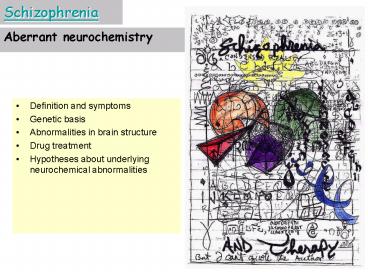Schizophrenia - PowerPoint PPT Presentation
1 / 43
Title:
Schizophrenia
Description:
Schizophrenia Aberrant neurochemistry Definition and symptoms Genetic basis Abnormalities in brain structure Drug treatment Hypotheses about underlying neurochemical ... – PowerPoint PPT presentation
Number of Views:104
Avg rating:3.0/5.0
Title: Schizophrenia
1
Schizophrenia
- Aberrant neurochemistry
- Definition and symptoms
- Genetic basis
- Abnormalities in brain structure
- Drug treatment
- Hypotheses about underlying neurochemical
abnormalities
2
Treatment of Schizophrenia
3
Treatment of Schizophrenia
4
Treatment of Schizophrenia
5
Treatment of Schizophrenia
6
Treatment of Schizophrenia
7
Treatment of Schizophrenia
8
Treatment of Schizophrenia
9
Drug Treatments of Schizophrenia
10
Drug Treatments of Schizophrenia
Chlorpromazine
Reserpine
11
How do these drugs work?
- Precise actions were not known!
- Side effects provided clues
- -Tremors and jerkiness in patients movements
- Parkinsons disease
- -discovery of dopamine
- precursor, L-dopa
12
If L-dopa ? dopamine and ? Parkinsonism
and chlorpromazine/reserpine ? Parkinsonism
Then chlorpromazine/reserpine ?
dopamine?? Schizophrenia due to excess activity
of dopamine
Dopamine hypothesis
13
Dopamine Hypothesis
- hyperfunctioning of dopamine circuits
- -presynaptic effect
- excessive release of dopamine
- -postsynaptic effect
- excessive sensitivity of dopamine receptors
- excess of dopamine receptors
14
How do these drugs work?
15
How do these drugs work?
- Chlorpromazine and reserpine are dopamine
- antagonists
Chlorpromazine competitive antagonist
16
Drug actions at the synapse
- antagonists prevent the action of NT
17
How do these drugs work?
- Chlorpromazine and reserpine are dopamine
- antagonists
Reserpine not a dopamine blocker Depletes
stores less dopamine released with each action
potential
18
Other evidence for Dopamine Hypothesis
- amphetamine psychosis
- binding affinity assays
19
Some Problems with the Dopamine Hypothesis
- Not all patients respond to drug treatment
- Full spectrum of symptoms not resolved
- Drugs not specific
- Atypical antipsychotics
e.g. Clozapine -may increase dopamine release in
some brain regions! -blocks serotonin receptors
20
Ongoing Issues for the Biological Basis of
Schizophrenia
- The disorder
- The cause
- The treatment
- Dopamine presynaptic versus postsynaptic
- Other neurotransmitters (serotonin, glutamate)
21
- Brain - structure and function
- Disordered brain - Schizophrenia
- Brain Behavior (brain plasticity)
22
Brain Plasticity changing your mind
23
In the rest of todays class
- Brain plasticity is now an accepted feature of
brain function - How do experiences change the brain?
- Model of learning at the level of the cell
- Evidence that different experiences alter
structure of brain and behavioral outcome
24
How do experiences change the brain?
Donald Hebb (1949)
Learning via the strengthening of existing
synapses
25
Hebbs model of how synapses are strengthened
Before learning
After learning
?
Electrical potential
Electrical potential
- Metabolic change
- Structural change
26
A laboratory model of Hebbs synapse
Bliss Lømo, 1973
Long-term potentiation in the hippocampus
27
A laboratory model of Hebbs synapse
Long-term potentiation in the hippocampus
record
stimulate
28
Synaptic plasticity
Learning via the strengthening of existing
synapses Postulated Hebbian synapse
Before learning
After learning
Electrical potential
Electrical potential
29
Synaptic plasticity
Learning via the strengthening of existing
synapses Postulated Hebbian synapse
Before learning
After learning
or
Electrical potential
Electrical potential
30
Experiences modify synapses
- Hebbs theory about how learning changes
synapses - Bliss Lomos empirical model of how learning
changes synapses
"To learn is to change. Education is a process
that changes the learner."
George Leonard
31
In the rest of todays class
- Brain plasticity is now an accepted feature of
brain function - How do experiences change the brain?
- Model of learning at the level of the cell
- Evidence that different experiences alter
structure of brain and behavioral outcome
32
Enrichment Studies
Impoverished
Standard
Bennett, Diamond, Krech, Rosenzweig 1960s
Enriched
Looked at animals living under a variety of lab
conditions
33
Measurable changes in brain as a function of
living environment
- Cortex size and weight
- Brain neurochemistry
- Cell body size
34
Some resistance.
growth just of bigger and better synapses that
are already there, not growth of new connections
John Eccles, 1965
35
Measurable changes in brain as a function of
living environment
- Cortex size and weight
- Brain neurochemistry
- Cell body size
- Structure of neurons
- More synapses
36
Measurable changes in brain as a function of
living environment
- Cortex size and weight
- Brain neurochemistry
- Cell body size
- Structure of neurons
- More synapses
- More new neurons!
37
More resistance
Read my lips NO NEW NEURONS!
Not a single cell with the physical
characteristics of a neuron born after infancy
was observed in the brain of any adult animal
Pasko Rakic The New Yorker 2001
38
Adult brains make new neurons
Rat Hippocampus
39
Measurable changes in brain as a function of
living environment
- Cortex size and weight
- Brain neurochemistry
- Cell body size
- Structure of neurons
- More synapses
- More new neurons
40
Environmental enrichment enhances learning
41
Experiences change brain and behavior
Experience
Brain
Behavior
42
New behaviors modify future experiences
Experience
Brain
Behavior
43
Experiences can also change how brain and
behavior interact
Experience
Brain
Behavior































